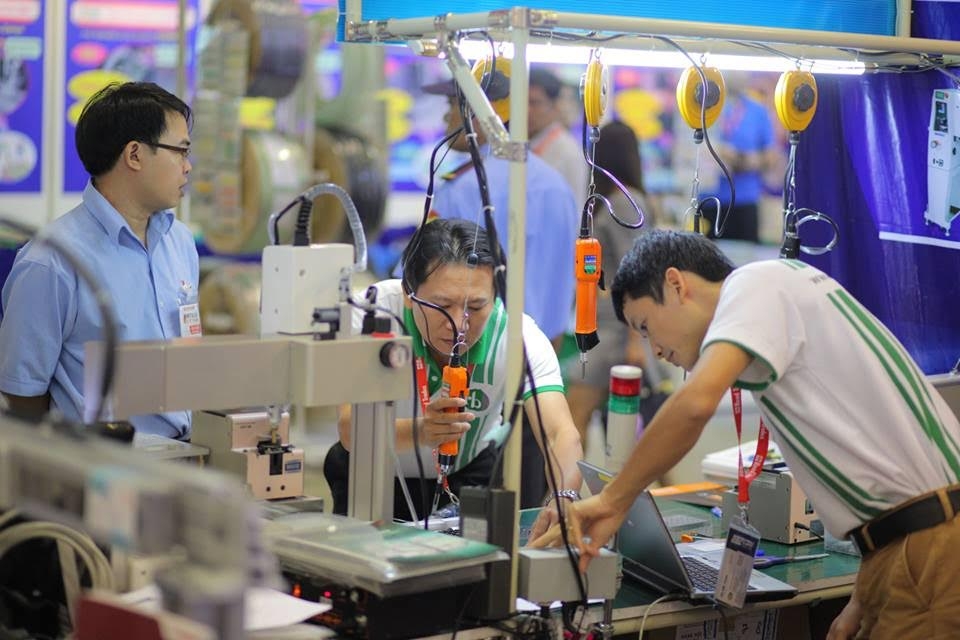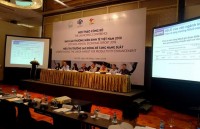Vietnam faces labor shortage due to China’s relocation production
Latest
| TIN LIÊN QUAN | |
| Vietnam urged to take actions for seizing investment from China | |
| Vietnam, RoK urged to enhance cooperation in diplomacy, security, defence | |
Vietnam is facing a labor shortage as FDI companies in electronics industry planned to move their factories from China to Vietnam, according to Navigos Group, operator of Vietnam’s biggest job portal VietnamWorks.
Navigos has issued the report on recruitment demands for senior management level in Vietnam in the fourth quarter of 2018, which started to feel the impact of free trade agreements and FDI on recruitment needs in Vietnam.
According to the report, these FDI companies are under major pressure in recruitment because the proposed salary is no more attractive than that offered by competitors, so candidates are still unsure about the decision to switch to another working environment.
Moreover, enterprises in the Electrical/Electronic field in northern cities of Hai Phong and Bac Ninh in the fourth quarter of 2018 also have plans to expand business. Besides, new companies will officially operate from the beginning of 2019, leading to a higher demand for recruitment in the field.
Because of the trend of shifting production from China to Vietnam and the expansion plan, the Electronic Manufacturing segment is predicted to see a rise in recruitment demand in 2019, including middle and high-level human resources in positions such as: Plant Manager, Supervisor, Management and Assistant level for back office.
Consumer electrics market remains competitive
Facing the intensive competition from E-commerce top companies with huge financial resources, the Consumer Electronics market clearly shows the trend of strongly shifting from traditional sales channels to e-commerce, stated the report.
Companies in this sector all have business expansion plans in 2019 and although the market has been very competitive, there are still niche markets where companies can exploit.
 |
| Vietnamese labors. (Photo: Hanoi Times) |
After the Lunar New Year, which falls in early February, recruitment demand in the Consumer Electronics sector will grow strongly, predicted the report. It is also noteworthy that some companies will enter the Vietnamese market, and it will be a great opportunity for both candidates and employers.
The demand for Marketing positions in the industry is increasing, especially from multinational companies. Because of the shortage in human resources, companies in this sector are willing to recruit candidates who had experiences in other industry such as FMCG.
FDI capital inflows to real estate sector to boost recruitment demand
In 2019, the report noted that investors are planning to adjust their portfolio (both directly and indirectly), thereby affecting supply chains and FDI inflows into the Real Estate market of Vietnam. The reason behind this mainly comes from two trends: shifting production from China to Vietnam and FDI flow into Vietnam to serve the consumer market in Vietnam and ASEAN.
In the fourth quarter of 2018, the Real Estate Market will see some mega projects, driving the strong increase of new real estate trading floors, leading to the high recruitment demand, especially positions related to Sales and Marketing.
In 2019, the Real Estate market is expected to grow steadily. Especially, the condominium market continues to grow, businesses will focus on recruiting positions related to Investment and Sales. In addition, the market in the Northern provinces, especially the neighboring provinces of Hanoi and the concentration of many industrial parks will be very bustling, which lead to the grow in hiring demand.
The Comprehensive and Progressive Agreement for Trans-Pacific Partnership (CPTPP) is projected to bring many benefits to Vietnam’s textile and garment industry, strongly boosting exports, along with the competitive workers’ salary in Vietnam, will attract more FDI inflows, from which many new jobs will be created.
In addition, multinational companies are operating in China, and both Chinese domestic companies in the fields of textiles, footwear, sporting goods, among others, tend to shift orders and production activities to other countries to avoid high taxation. In ASEAN, Vietnam is considered the most potential and competitive for the relocation of these businesses.
According to the report, many businesses that have been operating for many years in Vietnam are also in the process of expanding their scale of production. Facing an increasing recruitment demand in this industry, companies face more challenges in recruiting and retaining human resources.
The reason is that the textile industry is always thirsty for human resources, especially the high-level personnel who have specialized skills in the industry and can communicate in English. Currently, some businesses due to lack of competitiveness have lost workers and narrow down production or production is not at full capacity.
 | Cooperation between Vietnamese, Japanese localities facilitated Vietnam attaches importance to promoting locality cooperation with Japan, considering this a result-oriented and effective collaboration channel to step up economic, trade and labour ties ... |
 | Vietnam, Argentina forge stronger collaboration Argentine Minister of Foreign Affairs and Worship Jorge Faurie held talks with Deputy Prime Minister and Foreign Minister Pham Binh Minh in Ha Noi on ... |
 | Vietnam’s labour productivity increases in 5 years The average labour productivity in Vietnam increased from 1,700 USD per laborer in 2006 to 2,672 USD in 2017, according to the Vietnam Institute for ... |

























